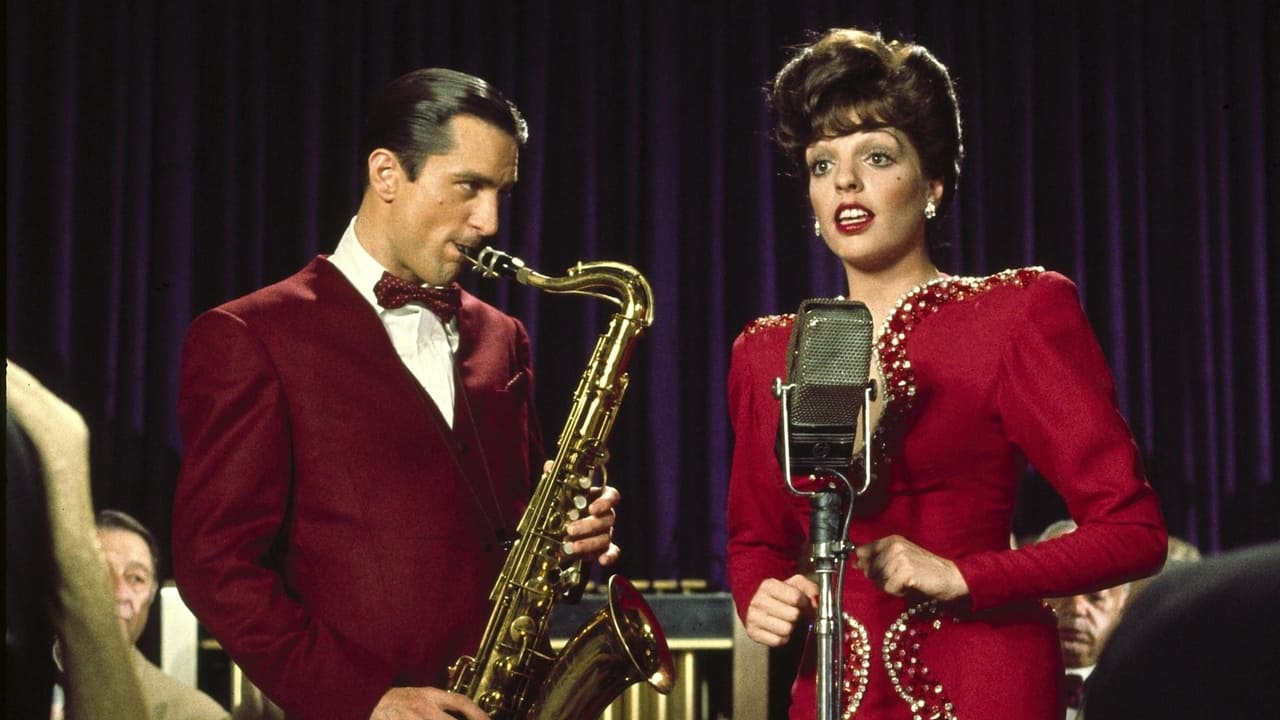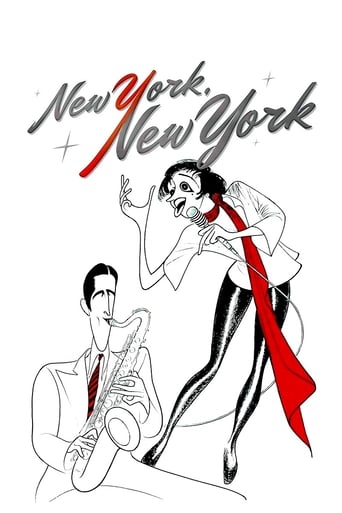

In the declining years of New Hollywood (1967-1980), a lot of the big directors who were successful during this time period made at least one film that was a major blow for their careers, financially and critically. For William Freidkin, it was Sorcerer (1977). For Peter Bogdanovich, it was At Long Last Love (1975). With a filmography like Martin Scorsese's, one wouldn't expect him to be in that boat. Unfortunately, New York, New York, his next film after Taxi Driver, put him in a career slump that led to his near-death from cocaine overdose. Scorsese made the film as a tribute to musicals from the Golden Age of Hollywood. Having not seen many of those, I can't say if this was successful as a tribute or not, but on its own terms, it's quite frustrating.The plot is that Jimmy Doyle (Robert De Niro) tries to hook up with Francine Evans (Liza Minnelli) during a V-J Day party (the film starts in 1945). He's initially unsuccessful, but at a later audition, the two discover each other's musical talents (she sings, he plays the saxophone), and they go through the next several years exploring their careers while trying to handle a rocky relationship that only deteriorates when Francine reveals her pregnancy.For me, at least, the most obvious problem is how the dialogue is handled. Scorsese films usually excel in it, but here, there is so much dialogue that drags scenes out and feel like each character is trying to explain everything he or she means. Other times, the dialogue can feel pretty sparse and useless. The opening scene is a prime example; when Jimmy keeps asking Francine for her phone number and tries to hit on her, all Francine keeps saying is "No," which keeps De Niro from coming with things for his character to say. Apparently, most of the dialogue was improvised and Scorsese had no control over it.Characterization is another major problem. Jimmy Doyle is supposed to be a guy who has a passion for music, but other than his scenes playing the saxophone, there doesn't seem to be much of an indication. He mentions it in one or two dialogue scenes, and one creative shot in the film where he plays under a light post shows off that passion, but besides that, you could easily miss that part of his character. He is also very annoying. Because of all the improvisation, De Niro just seems to be phoning in his performance and plays the character as extremely socially awkward with a temper, and as a guy who will not shut up. Nearly every time he started talking, I groaned in exasperation. The only real time when Jimmy seems to have any depth is during a large part of the second half where it is clear that he is jealous of Francine's constant career boosts while he struggles to get anywhere. Nobody calls him out on his flaws, either.Minnelli's Francine doesn't fare much better. Very little is revealed about her, except for her passion for singing, similar to Jimmy. She doesn't seem to be making that much effort to make her own decisions as a character, and while putting up with Jimmy for so long is admirable, it was so nonsensical, that in some of the later scenes, I kept thinking, "Just divorce this guy already." Thankfully, when Jimmy is not present, Minnelli makes the character shine with her singing skills and the last forty minutes are a treat due to that reason alone.For the most part, the production design looks well-done, although a few sets are obviously fake, although, Scorsese also made this a directorial choice. The design mostly stands out in some of the later scenes when Francine is making a career of her own away from Jimmy, such as when it revels in its "Happy Endings" musical number. Of course, Francine does sing "New York, New York," and while Frank Sinatra is usually identified with the song, Minnelli's voice arguably goes even better with it, as it is smoother and has much more energy.To conclude, New York, New York had plenty of ambition, but it's let down by the frustrating-to-sit-through dialogue scenes and the characterizations of both De Niro's Jimmy and Minnelli's Francine. I've complained about musicals that include songs which stop the story and go on for too long, but here, the story is what goes wrong. This film was a box office flop for United Artists, and while the film did hurt Scorsese as a person and as a director for a time, he did eventually bounce back with some hits throughout the 80s and 90s.
... View MoreIt's V-J Day in New York. Jimmy Doyle (De Niro) is an aggressive, volatile saxophone player. He relentlessly pursues USO singer Francine Evans (Liza Minnelli). She eventually goes with him on an audition and it's a long rocky relationship as her star rises.This Martin Scorsese film comes right after Taxi Driver. Jimmy Doyle is essentially Travis Bickle with a little more social graces. There is a split in intention from the two movie leads. Jimmy Doyle is driving towards a dark disturbing story like Taxi Driver. It is off-putting but fascinating. On the other hand, Liza Minnelli seems to be pushing for a Broadway musical. There are a couple of good songs including the iconic New York, New York. I just don't see why she would ever go with him since she doesn't have the prerequisite damage. Neither really works and they certainly don't work together. I'm wondering if the movie would function better with an even darker ending.
... View MoreI know that some people consider New York, New York (NYNY, for short) extraordinary. OK. Fine. But, you can bet, Derringer here ain't one of 'em. No way.When NYNY was first released, back in 1977, it was a super-staggering 4 1/2 hours in length. Like, can you just imagine having to tolerate listening to the vocal "talents" of Miss Liza Minnelli for that unendurable period of time? Phew! Now, that would've been pure torture to the 10th power! At present NYNY has a lengthy enough running time of 2 1/2 hours, which, to be sure, is unbearable enough as it is. But still much easier on the eyes, ears, nose, and, yes, stomach, than a super-deadly 4 1/2 hours.Directed by Martin Scorsese (of all people), NYNY may, in fact, be a super-duper, splashy-dashy musical extravaganza alright, but, by the same token, I found its story to be so utterly insipid that it quickly put me off completely even before I realized what was happening.Set in 1945, during the "Big Band Era" - NYNY amounted to being nothing more than a total "rags-to-riches" story with lots'n'lots'n'lots of musical interludes thrown in for good measure.Insufferably arrogant saxophonist, Jimmy Doyle (Robert De Niro), and infuriatingly naive VSO singer, Francine Evans (Liza Minnelli), a couple of typical "nobodies", meet in (where else?) New York on V-J Day at the end of WW2. These 2 bozos end up loving a little, bickering a lot, but most of the time spending their lives apart, just clawing their own way to the top of the heap, as "wannabe" big-time celebrities.This relationship between Jimmy and Francine was so irritatingly strained and rocky at times that it all got real tiresome, real fast.And, how was I feeling after watching this gruelingly-long picture? Well, let me tell ya' - I was certainly not in any "New-York-State-Of-Mind" by the end of it, that's for sure - No way - I mean, it was more like a splitting head-ache state of mind, if you wanna know the truth about it.Uh..... Pass the aspirins, please.
... View MoreDirector Martin Scorsese is best known for his searing portrayals of urban life and its corruptions, as detailed in acclaimed films like "Taxi Driver" (1976), "Raging Bull" (1980) and "Goodfellas" (1990), but here, in the first of many directorial moments where he demonstrated his verisimilitude, he lovingly crafted a musical with a twist. "New York, New York" (1977) has the glorious look of an MGM Technicolor musical of the late forties or early fifties, from the plentiful sets recreating the artifice of the Big Apple in large sound stages in Hollywood, to the costumes and makeup, Scorsese flawlessly imitates the style, the look of another era of cinema. Yet if this was all there was, the film would be an empty, hollow stylistic exercise; instead, the characters that populate this entirely synthetic world are completely real, De Niro and Minnelli creating complex, fascinating characters. Working like the great improvisatory director John Cassavetes, Scorsese coaxes flowing performances from his two leads, detailing their relationship and the conflicts that stem from their deeply musical, creative personalities. Lionel Stander has a memorable supporting role, his distinctive, strong New York accent dominating his scenes. However, this film is defined by the trio of Scorsese, De Niro and Minnelli who collectively define the film.The production design by Boris Leven, who himself had designed "West Side Story" (1961), is excellent; the cinema's view of the Big Apple circa 1945 once more brought to the screen and counterpoints the realism of the characters in a satisfying contrast. Famed Hungarian cinematographer László Kovács shoots in the characteristically Baroque style of the forties while employing some incredible crane shots to remarkable effect.However, one of the key facets for any musical to be a success is its score, and with songwriters John Kander and Fred Ebb, who wrote the music for the original stage productions of "Cabaret" (1966) and "Chicago" (1975), the film achieves magnificently. The title song, subsequently covered by Frank Sinatra, is justifiably iconic, but "The World Goes Around" and the lavish ironic musical number "Happy Endings", invoking the extravagant set pieces of Busby Berekly in the 1930s musicals also help assure the picture's position as the finest original musical of the last forty years.A passed over classic, a forgotten great of New American Cinema of the 1970s, this deserves to be seen once more and appreciated for its tremendously fresh achievement.
... View More